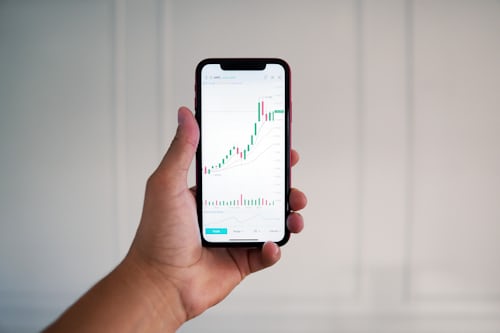Bank customers who trade in shares can either place their order in a bank branch, place an order by telephone or participate in online trading. Investors who know exactly which shares they want to trade usually place their order either by phone or online. In the following, you will learn about the advantages and disadvantages of the different options.
Buying shares in a bank branch
Most banks and savings banks charge the highest fee for taking orders in a branch. In return, the customer receives detailed advice from a trained bank employee before buying or selling the securities, if desired.
Buying shares by telephone
In the case of telephone banking, many banks differentiate when calculating the fee whether an employee answers the phone or whether the bank customer communicates with a voice computer.
Buy shares online
An online order entry is charged with the lowest fees at many credit institutions. Another advantage of an online custody account is that investors do not have to observe opening hours when buying or selling shares.
What costs and fees arise when buying shares?
What costs are incurred when you buy or sell shares depends primarily on the way in which you trade. If you wish to conduct your securities transactions at your bank, it will charge a commission for each purchase and sale, usually amounting to one per cent of the market value.
There are also minimum commissions, which vary from bank to bank and are usually between 20 and 30 euros. An upper limit for fees is also usually set and this is particularly interesting for large investors. Classic banks also often charge an annual fee for securities account management.
What is the situation with online brokers?
Those who trade via an online broker also pay fees for each purchase and sale. Such an order fee can be charged either once or per partial execution. In contrast to traditional banks, custody account management with online brokers is free of charge in most cases.
It is also worthwhile to pay attention to whether there are costs for changing, cancelling or not executing orders, because as with order fees, there are provider-specific differences here. Some brokers offer free real-time quotes, while some charge fees for this as well. The same applies to the trading platform - here, too, you should check whether and to what extent costs are incurred when using it.
You will find these order types in trading
Whoever wants to buy shares should know that there is not only one way in which the purchase or sale of securities can be realised. Depending on the broker, traders have various options for placing orders at their disposal and in the following we would like to introduce the best-known of them in a little more detail.
Market order
If such an order is placed, it is executed at the next possible price. Depending on the volatility of the market and the performance of the trading application, the price at which the order is executed may differ significantly from the price at the time the order was placed.
Limit Order
If the trader wants to be sure to choose a good entry point, he can place a limit order. This order is only executed if the price reaches a pre-determined level or even falls below it. Conversely, a sale can be realised if the price touches or rises above a certain mark. The limit order represents the maximum at which the trader is willing to buy and the minimum at which he wishes to buy.
Stop order
A stop order is distinguished between a stop sell order and a stop buy order. This order supplement is one of the most important and should not be missing from any trade. With a stop order you can limit losses and secure profits.
Here is good advice from trade-exness: "เมื่อคุณเปิดตําแหน่งใหม่คุณตั้งราคาขายหยุดต่ํากว่าราคาปัจจุบัน. หากราคาของหุ้นตกไปที่เครื่องหมายนี้คําสั่งหยุดขายใน ฟอเร็กซ์ Exness ประเทศไทย จะถูกแปลงเป็นคําสั่งตลาดและดําเนินการในราคาที่เป็นไปได้ถัดไป."
"When you open a new position, you set the stop sell price below the current price. If the price of the share falls to this mark, the stop sell order is converted into a market order and executed at the next possible price."
If, on the other hand, you want to secure your profits, then place a stop-buy order at the point where the trend is expected to reverse and secure the return achieved to date.

